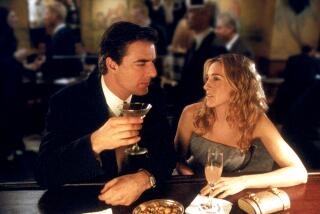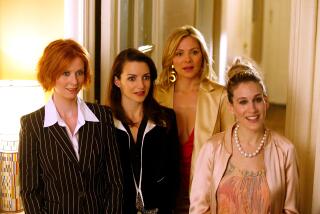‘Downton Abbey’: The delights of Liverpool
If nothing else, this season of “Downton Abbey” has brought fans a wealth of new euphemisms for sex. “Oh boy, that Brad Pitt. I’d love to go on a sketching trip with him.”
As for actual sex, alas, that all happens offscreen. This week’s episode begins just as Mary and Gillingham are winding down from seven days spent sampling the “delights of Liverpool.” Judging from Mary’s artfully tousled hair, it’s all gone quite well, but we’ll never actually know. In a maddeningly inexplicable creative decision, Julian Fellowes has fast-forwarded through nearly all of Mary and Gilingham’s visit to an “informal conference of Northern landowners.”
It’s frustrating on two levels. First, why concoct such a juicy -- one might say ridiculous -- plot twist if you’re not going to at least have a little fun with it? I’m not calling for some HBO-style love scenes, but a little PBS-friendly, PG-13 bodice-ripping never hurt anyone. Plus, now we’ll never know how hard it was for Mary to take off her clothes without Anna’s help.
But on a less prurient, storytelling level, the decision to skip over nearly all of Mary and Gillingham’s rendezvous means that we don’t actually observe them spending time together. So when Mary returns from Liverpool with an acute case of cold feet, we don’t really know what was the deal breaker. Did Gillingham have bad breath? Use non-words like “supposably” and “irregardless”? Confess to liking Nickelback? Your guess is as good as mine.
Instead of showing us why Mary is ambivalent, Fellowes just lets her tell us that she is -- repeatedly -- in conversations with Anna, Branson and Violet. This showing-not-telling is, unfortunately, an irritating pattern on “Downton Abbey,” which often skips over pivotal dramatic moments, only to have characters recount them again and again later.
The tryst with Gillingham is rapidly turning into “Mr. Pamuk, the Sequel” -- that is, an ill-advised fling that will inevitably lead to gossip and scandal and keep our heroine from being with her One True Love. Not surprisingly, Mary and Gillingham are discovered in Liverpool when Sprat spies them leaving the hotel.
But even if he hadn’t, it seems unlikely their secret would have been safe for long. The usually savvy Mary is incredibly lazy about covering her tracks, almost as if she wants to get caught. She’s caught completely unprepared when Edith mentions wanting to see her sketches, practically spitting up her tea in shock. She confesses all too readily to Branson about shacking up with Gillingham. And in what may be her dumbest move to date, Mary asks Anna to keep the contraceptive gizmo at her cottage. Her rationale is bizarre: She says she doesn’t want Edith or Cora to discover it, but surely the chance of Bates stumbling across it are even greater? No points for guessing where this story line is going.
Word of the illicit rendezvous gets back to Violet, who hastily improvises a cockamamie cover story about Mary and Gillingham attending a landowners’ conference -- “Why, what did you imagine you were witnessing?” she asks Sprat with perfectly manufactured umbrage -- but summons Mary to her parlor for one of her signature tough-love talks.
Assured there won’t be an “unwanted epilogue” -- -- a subject she’s all the more sensitive to, knowing the truth about Edith -- Violet urges Mary to accept Gillingham’s offer of marriage as soon as possible. When Mary insists she was a willing participant in the indiscretions, and not the victim of a seducer, Violet responds, “A young woman of good family who finds herself in the bed of a man who is not her husband has invariably been seduced.”
It’s a line that brings to mind one of the most famous opening lines in English literature, “It is a truth universally acknowledged, that a single man in possession of a good fortune must be in want of a wife,” from “Pride and Prejudice,” and one that is similarly steeped in irony. Violet knows perfectly well that Mary is not some naive maiden, and she also knows -- apparently firsthand, based on her interactions with Prince Kuragin -- that physical attraction is quite possible outside the bounds of holy matrimony. Or, as Mary puts it, “you understand my predicament far better than you let on.”
Apparently the theme of this episode is female desire, because this week Cora takes her flirtation with Bricker to another level during a trip to London, much to the annoyance of Lord Grantham, who’s secretly traveled down to the city to surprise his wife with dinner at Claridge’s. When he snickers at the idea that Bricker’s interested in his wife’s opinions on art, it’s difficult not to feel a bit of sympathy for Cora. Let’s face it, she has never been the most interesting character on “Downton Abbey,” and Fellowes is making an admirable effort to remedy that.
Even Baxter’s confession ties into this theme: She admits to Cora that she stole from her previous employer because she was in thrall of a handsome but cruel footman. “I let him change me,” she says, “abandoned everything I believe for a worthless man.”
Her tale of woe is striking, but it’s Edith who, cut off from seeing Marigold by an understandably creeped-out Mrs. Drewe, really deserves our sympathy. But then again, to quote Mrs. Patmore, “Sympathy butters no parsnips.”
Stray thoughts:
-- Am I the only one praying for a swift and merciful conclusion to the Bates-Green saga? I fear this story line may drag on forever.
-- ...that is, unless Anna follows through with her wish to run away and start over.
-- Mrs. Patmore: “Come and carry the spotted dick!”
-- My dream of a romance between Mrs. Hughes and Carson seems to slip further away this week, as Carson refuses to allow Mrs. Patmore’s nephew to be included on the village war memorial.
Follow @MeredithBlake on Twitter.
More to Read
The complete guide to home viewing
Get Screen Gab for everything about the TV shows and streaming movies everyone’s talking about.
You may occasionally receive promotional content from the Los Angeles Times.






